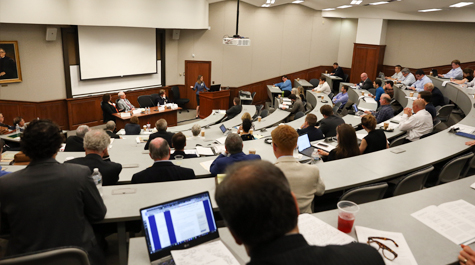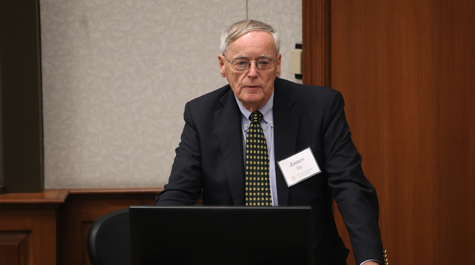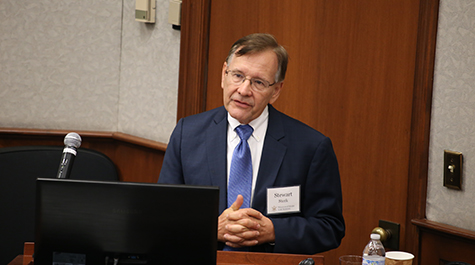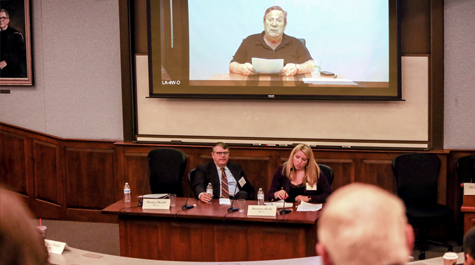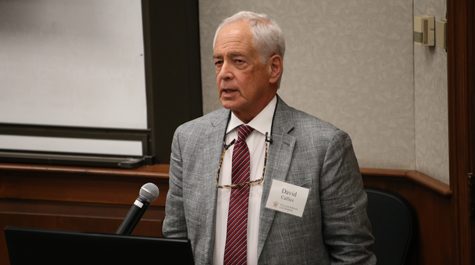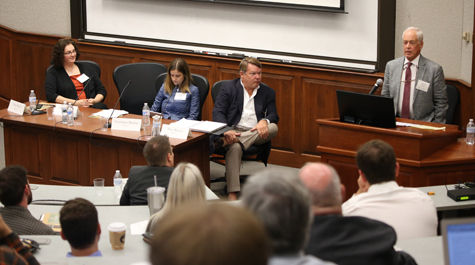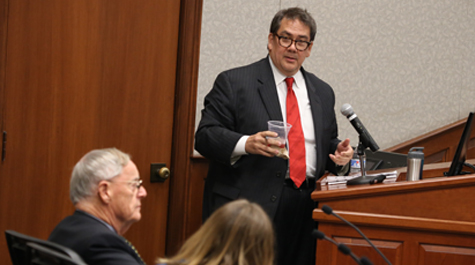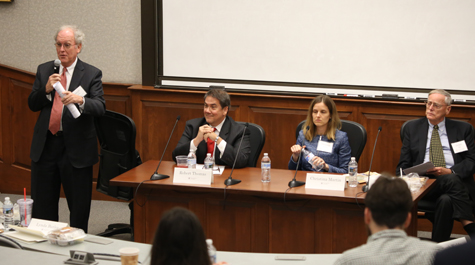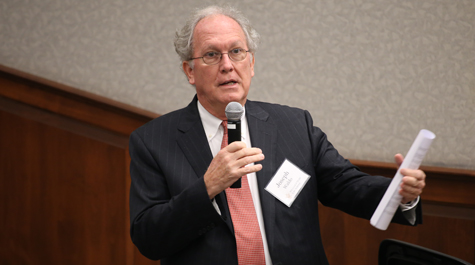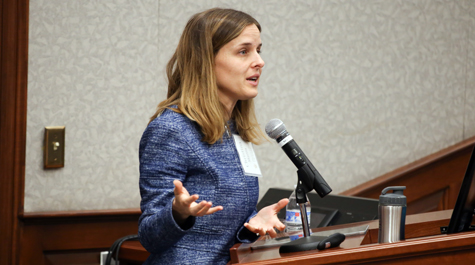Brigham-Kanner Property Rights Conference celebrates 15 years at William & Mary
Helping officially to kick off the 15th annual Brigham-Kanner Property Rights conference at William & Mary Law School, property rights lawyer Andrew Brigham looked around the Great Hall of the historic Sir Christopher Wren Building, the oldest academic building still in use in America, and asked a simple question.
“Is it a wonder that this is a place where theory and practice come together” he asked.
It’s certainly no wonder to the many scholars and practitioners who come from around the world to attend the event each year. The brainchild of Joseph T. Waldo ’78, a successful eminent domain attorney, the conference began in 2004 and quickly became notable for its encouragement of active participation from the audience through its question and answer segments with each of the panels.
Brigham, an attorney from Brigham Property Rights Law Firm, PLLC, in Jacksonville, Fla., and son of Toby Prince Brigham for whom the conference was named along with Gideon Kanner, reminisced about the conference’s first 15 years. He highlighted the important legacy of the experts who have received the annual Brigham-Kanner Property Rights Prize since 2004.
“I'm hopeful that there are people in this room, whether you’re a scholar or a practitioner, who draw something from attending this conference,” Brigham said. “And I hope, as you look back and see the many accomplishments of those who have been honored, that you will be inspired.”
This year’s event was indeed inspirational as scholars and practitioners traveled to Williamsburg to participate in panel discussions and moderated sessions. Panel and roundtable topics included: “The Federalism Dimension of Constitutional Property,” “Background Principles of Common Law and Constitutional Property,” “Other Emerging Issues in Constitutional Protection of Property,” “Property and Social Justice,” and “The Constitutionality of Land Use Exactions.”
“I attend many legal conferences every year, but this one is special,” said Robert H. Thomas of Damon Key Leong Kupchak Hastert in Honolulu, and William & Mary Law School’s inaugural Joseph T. Waldo Visiting Chair in Property Rights Law. “It brings together the practicing bar and the legal academy and puts us in one room to frankly discuss the most pressing and important property rights issues each year. The Conference contributes not only to thinking about the law, but shaping it for the future.”
For the first time, this year’s conference featured more student outreach, with a preconference lunch presentation, “Snapshots of a Property Rights and Eminent Domain Law Practice” and workshop sessions that allowed students to hone their interview skills and ask questions not normally entertained by lawyers interviewing them for potential job placement.
“I heard from some of the greatest property attorneys and academics in the country,” said Kelsey Thwaits, a third year law student interested in working in land use, eminent domain, and environmental law. “The conference highlighted various ways of approaching property rights and the issues that arise when there are competing interests at play between governments and property owners. Having exposure to so many differing viewpoints was invaluable and I appreciate the opportunity to attend such an event.”
Classmate Ed Walton was particularly glad of the networking opportunities. “The conference offered me the unique opportunity to build relationships with some of the nation’s leading property experts and practitioners, and learn about key legal developments in property law,” Walton said. “I hope to return for future conferences as an alumnus.”
For Blake Willis ’18, who graduated in May and who now works for the property rights firm Waldo & Lyle in Norfolk, Va., the conference was a welcome homecoming. “Having attended the conference twice, first as a student and now as someone who defends property rights every day, I have been able to see how valuable an experience it is,” Willis said. “It’s a wonderful opportunity not only to network but also to hear from the brightest minds in property rights as they discuss some of the most important cases, trends, and issues in the field.”
A highlight of the conference each year is the opening banquet, during which the Brigham-Kanner Property Rights Prize is awarded to an individual whose work has advanced the cause of property rights and has contributed to the overall awareness of the important role property rights occupy in the broader scheme of individual liberty. This year's award recipient was Stewart E. Sterk, the H. Bert and Ruth Mack Professor of Real Estate Law and Director of the Center for Real Estate Law & Policy at the Benjamin Cardozo School of Law of Yeshiva University in New York City.
Also honored was Joseph T. Waldo, founder of Waldo & Lyle in Norfolk, Va., who served as Co-Chair of the conference from 2004-17. During the dinner, Professor Lynda Butler, the Chancellor Professor of Law at William & Mary Law School and director of the Property Rights Project, shared a statement from former William & Mary President and Law Dean Taylor Reveley that celebrated Waldo’s accomplishments.
“Deans of law schools and presidents of universities appreciate people who bring them creative, important ideas,” Reveley said. “Deans and presidents get affirmatively excited about people who not only come with engaging ideas, but also put their shoulders to the wheel to get them off the ground and to safe flight. Joe Waldo is such a person. He saw the potential for a property rights conference at the country’s oldest law school, a conference that would bring together both practicing lawyers and academic lawyers, and that would annually celebrate one of the most august scholars or practitioners in the field. Having seen the potential, Joe then was crucial in bringing it to life through his own generosity, the generosity he encouraged in others and his work on the substance and recruiting for the conference. And so we have the Brigham-Kanner Conference in full cry, celebrating its 15th birthday. Well done, Joe Waldo.”
The scope of the conference continues to take on international perspectives as more and more countries deal with property rights issues. And the conference has followed suit with William & Mary cosponsoring the 2011 conference with Tsinghau Law School in Beijing, China, and the 2016 conference with the Grotius Center of International Legal Studies at the World Court in The Hague, Netherlands. Future international events are being planned.
Such growth in perspective and reach suits Robert Thomas just fine, even if he has to travel farther to find it.
“At its 15 anniversary, the Conference has reached the ‘next level,’” Thomas said. “The word is out in the practicing bar and in the academy that this is the place to be, alongside the lawyers and legal scholars who are shaping property rights law. That’s why the Brigham-Kanner Conference is the highlight of my yearly conference calendar.”
About The Property Rights Project
The William & Mary Law School Property Rights Project promotes the exchange of ideas between scholars and members of the property rights bar through lectures, an annual conference, and publication of the Brigham-Kanner Property Rights Conference Journal. The Project recognizes outstanding contributions of individuals to the field of property rights through scholarship or other accomplishments with the annual Brigham-Kanner Property Rights Prize.
About William & Mary Law School
Thomas Jefferson founded William & Mary Law School in 1779 to train leaders for the new nation. Now in its third century, America's oldest law school continues its historic mission of educating citizen lawyers who are prepared both to lead and to serve.
